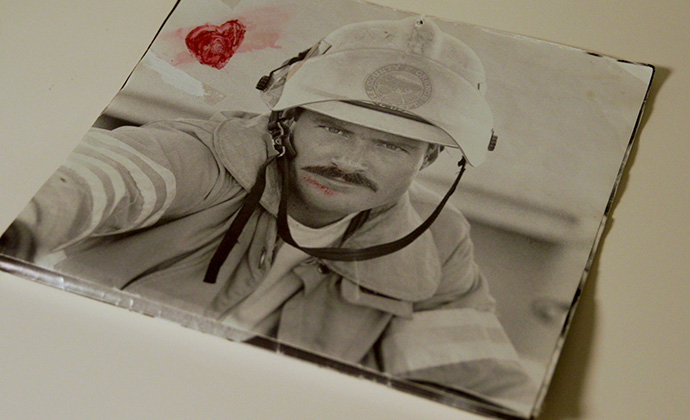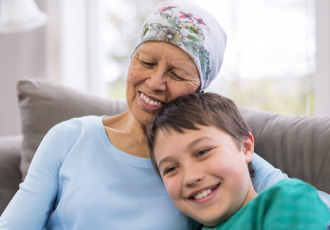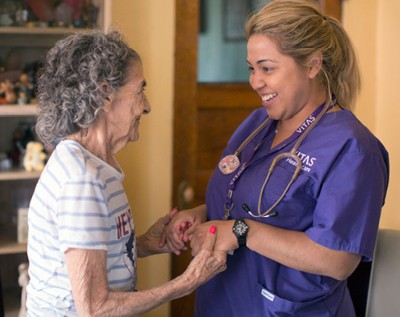A Choice to Get the Most Out of Life
The first time Jim Forrester spoke with a VITAS physician, his requests were simple, yet profound.
“I want to sleep through the night,” he said. “I want to walk again.”
His doctor asked, “What else would you like?”
Jim looked him in the eye and said, “I’d like to feel happy.”
For Jim, a retired firefighter who had spent his life taking care of others, these were the building blocks of a bigger wish: to make the most of the time he had left. He wanted to be in the San Clemente home where he'd fostered puppies, watched his grandchildren grow, and built a life with his wife, Debbie.
But his illness, a fast-moving squamous cell carcinoma, had drained his energy. The surgeries, the pain, the exhaustion—it had all taken its toll, and Jim found himself stuck in bed, unable to do the things that had once been second nature. He was ready for something different. So, when the doctors gave him six months, the Forresters made a bold decision: They chose hospice care.
And just like that, life shifted.
Reclaiming Control With a Plan
It didn’t take long for the VITAS team to get Jim’s medication regimen in place. Within a day, the relief was palpable. Jim, who hadn’t been able to walk in weeks, found himself standing at the top of the stairs.
“How did you get up there?” Debbie asked in disbelief.
“I walked,” Jim said, a grin spreading across his face.
Whether it was a nurse checking in or a chaplain offering emotional support, I never felt alone. They were there for both of us.-Debbie Forrester
This wasn’t a miracle. It was a plan, carefully designed and executed by a team of professionals who knew Jim’s needs—and his desires. The goal wasn’t to prolong suffering or delay the inevitable, but to enhance Jim’s quality of life in the time he had left. And it worked.
The physical improvement wasn’t the only change. Jim’s mental and emotional health were transformed too. He could focus on the important things—the things that really mattered—rather than his illness. The Forresters hosted family dinners every Sunday, and Jim even took up cycling again with the help of an electric bike.
“Watching my grandkids grow up—it's a gift,” Jim said during those final months. “I’ve taken it for granted that they’ll always be here, but now I’m more present. I’m savoring it.”
That’s what hospice can do. It gives you the space to savor what’s left, to enjoy those moments, to make them count.
The Power of Being Prepared
For Jim, the decision to choose hospice wasn’t just about him—it was about the legacy he’d leave behind.

Having been a firefighter for 33 years, Jim had seen countless end-of-life situations. He knew the importance of early hospice care, and he was determined not to make the same mistake his father had made: waiting too long to seek help.
Hospice care, he believed, shouldn’t be something you turn to at the last minute. “I’ve seen too many people wait too long to access it,” Jim said. “I didn’t want to wait. I wanted the benefits now, and I’m so glad I did.”
The evidence-based data backs him up. Multiple studies have found that greater utilization of hospice during the last six months of life is associated with increased satisfaction and quality of life. These studies indicate longer stays amount to better outcomes, fewer hospitalizations, and less strain on caregivers.1-5
The Gift of Support
For Debbie, being Jim’s caregiver had been overwhelming. The constant coordination of his care was exhausting, and the emotional toll was immense.
But once VITAS stepped in, that burden lightened. The team was always there, a constant source of support, with answers to her questions and reassurance that Jim was getting the care he needed.
“I could always count on them,” Debbie said. “Whether it was a nurse checking in or a chaplain offering emotional support, I never felt alone. They were there for both of us.”
This sense of relief, of knowing Jim was in good hands, allowed Debbie to focus on what mattered most: their time together.
Making the Most of Every Moment
The Forresters’ only regret? They didn’t start hospice care sooner. But once they did, it gave them the freedom to make the most of the time they had left.
Hospice gave me the chance to say goodbye on my terms.-Jim Forrester
A few weeks into Jim’s hospice journey, a group of his old firefighter friends organized a celebration of his life. Jim, still feeling well thanks to his VITAS care team, was able to attend and soak in the love and admiration of the people who meant so much to him. He even had a few laughs, joking about his days in the firehouse, as friends shared stories about his pranks and his unwavering support.
Jim and Debbie made new memories, too. They took family photos, recorded videos, and cherished the moments they still had. “Hospice gave me the chance to say goodbye on my terms,” Jim said. “And I could do it with dignity and peace.”
As for Debbie, she couldn’t have agreed more: “If you know your time is short, don’t fight hospice care. It’s a lifeline. It’s about making the time you have left matter.”
Four months after he chose compassionate hospice care, Jim passed away at home surrounded by his loved ones.
1Aldridge M., et al. (2022). Association between hospice enrollment and total health care costs for insurers and families, 2002-2018. JAMA Health Forum. 3(2), e215104-e215104).
2Harrison, et al. (2022). Hospice Improves Care Quality For Older Adults With Dementia In Their Last Month Of Life: Study examines hospice care quality for older adults with dementia in their last month of life. Health Affairs, 41(6), 821-830.
3Kleinpell, et al. (2019). Exploring the association of hospice care on patient experience and outcomes of care. BMJ Supportive & Palliative Care, 9(1), e13-e13.
4Kumar, et al. (2017). Family perspectives on hospice care experiences of patients with cancer. Journal of Clinical Oncology, 35(4), 432.
5Wright, et al. (2010). Place of death: correlations with quality of life of patients with cancer and predictors of bereaved caregivers' mental health. Journal of Clinical Oncology, 28(29), 4457.

Talking About Hospice
Do you want to start a conversation with your family about hospice?
Download Our Discussion Guide
